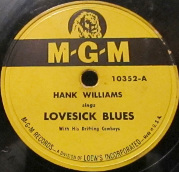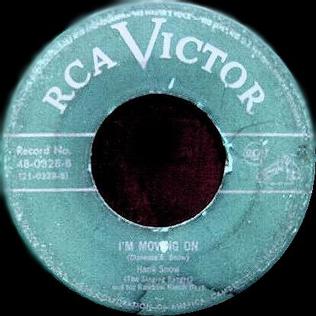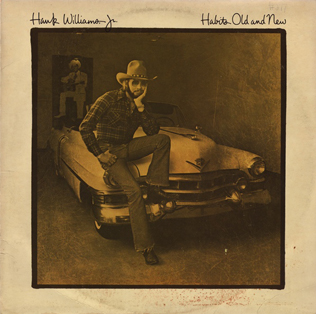Related Research Articles

If My Heart Had Windows is the second album recorded by country music artist Patty Loveless, and was released in 1988. The title track — a cover of a George Jones song from 1967 — became Loveless' first top ten hit, peaking on the Billboard Country Music charts at number 10. It was then followed by her biggest chart position at the time with "A Little Bit In Love," a song written by country artist Steve Earle. It also features a recording of the song "Baby's Gone Blues", which would be recorded by Shelby Lynne for her 1990 album Tough All Over and by Reba McEntire for her 1992 album It's Your Call.

"Hey, Good Lookin'" is a 1951 song written and recorded by Hank Williams, and his version was inducted into the Grammy Hall of Fame in 2001. In 2003, CMT voted the Hank Williams version No. 19 on CMT's 100 Greatest Songs of Country Music. Since its original 1951 recording it has been covered by a variety of artists.

"Lovesick Blues" is a Tin Pan Alley song, composed by Cliff Friend, with lyrics by Irving Mills. It first appeared in the 1922 musical "Oh, Ernest", and was recorded that year by Elsie Clark and Jack Shea. Emmett Miller recorded it in 1925 and 1928, followed by country music singer Rex Griffin in 1939. The recordings by Griffin and Miller inspired Hank Williams to perform the song during his first appearances on the Louisiana Hayride radio show in 1948. Receiving an enthusiastic reception from the audience, Williams decided to record his own version despite initial push back from his producer Fred Rose and his band.

"Kaw-Liga" is a country music song written by Hank Williams and Fred Rose.
"Honky Tonk Blues" was a hit country and western song written and performed by Hank Williams. The original 1952 recording was a major hit, and it later became a hit for later-day superstar Charley Pride.

"I'm Moving On" is a 1950 country standard written by Hank Snow. It is Snow's most recorded song.

Habits Old and New is the thirty-first studio album by Hank Williams Jr. and was released under Elektra Records/Curb Records in June 1980. Habits Old and New was Williams' third full-length album in a fourteen-month span, following Family Tradition and Whiskey Bent and Hell Bound that were released in April and November 1979. It was also his fifth album on the Elektra/Curb label.
"All for the Love of Sunshine" is a song written by music executive Mike Curb, Harley Hatcher and Lalo Schifrin, recorded by American country music singer Hank Williams Jr. The song went to number one on the Billboard Hot Country Singles chart in September 1970. Williams was backed by The Mike Curb Congregation on the song. It is featured prominently in the Clint Eastwood film Kelly's Heroes.

The discography of all albums and singles released by Hank Williams Jr. consists of 56 studio albums and 25 compilation albums. He has released 109 singles and 24 music videos. Eleven of his singles have reached Number One in either the United States or Canada.

Hank Williams Jr.'s Greatest Hits, Vol. 3 is a compilation album by American musician Hank Williams Jr. released by Warner Bros. Records in February 1989. The album includes eleven tracks, eight of which were Number One and Top 10 singles on the Billboard Hot Country Singles & Tracks chart released on the studio albums Five-O, Montana Cafe and Born to Boogie. The song "My Name Is Bocephus" was originally a track recorded for Montana Cafe, but Williams later recorded a live version of the song and included it on the live album, Hank Live. The live version was the one used for the compilation. The album included two original singles, "There's a Tear in My Beer" and "Finders Are Keepers", that peaked at number 7 and number 6 respectively on the Billboard Hot Country Singles & Tracks chart.

"She's All I Got" is a song written by Gary U.S. Bonds and Jerry Williams Jr. It has been recorded by several artists. The first version, released in 1971 by Freddie North, was a Top 40 U.S. pop hit, and a version by Johnny Paycheck was a number 2 U.S. country hit that same year. A second country music version was released on Conway Twitty's 1972 Decca LP I Can't See Me Without You. There was also a version titled "He's All I Got" that was on Tanya Tucker's 1972 album Delta Dawn. Yet another cover titled "Don't Take Her She's All I've Got" was released by Tracy Byrd, whose version reached number 4 on the U.S. and Canadian country singles charts. Co-author Jerry Williams Jr., aka Swamp Dogg, released his own version on his 2020 album Sorry You Couldn’t Make It.
"Long Gone Lonesome Blues" is a 1950 song by Hank Williams. It was Williams' second number-one single on the Country & Western chart. "Long Gone Lonesome Blues" stayed on the charts for 21 weeks, with five weeks at the top.
"Blue Blue Day" is a 1958 single written and originally performed by Don Gibson.
"Take These Chains from My Heart" is a song by Hank Williams. It was written by Fred Rose and Hy Heath and was recorded at Williams' final recording session on September 23, 1952, in Nashville. The song has been widely praised; Williams' biographer Colin Escott deems it "perhaps the best song [Rose] ever presented to Hank...It was one of the very few songs that sounded somewhat similar to a Hank Williams song." Williams is backed by Tommy Jackson (fiddle), Don Helms, Chet Atkins, Jack Shook, and Floyd "Lightnin'" Chance (bass). In the wake of Williams' death on New Year's Day, 1953, the song shot to No. 1, his final chart-topping hit for MGM Records. Like "Your Cheatin' Heart," the song's theme of despair, so vividly articulated by Williams' typically impassioned singing, reinforced the image of Hank as a tortured, mythic figure.
"Devil in the Bottle" is a song written by Bobby David and recorded by American country music artist T. G. Sheppard. It was released in October 1974 as his debut single and the first from his album T. G. Sheppard, and reached number one on the U.S. country singles chart. The single spent a single week at number one and a total of ten weeks on the chart. The single was released on the Melodyland Label, a country music, Motown subsidiary.
"Texas Women" is a song written and recorded by American musician Hank Williams Jr. It was released in February 1981 as the first single from the album Rowdy. The song was Williams Jr.'s third number one on the country chart, the first since "Eleven Roses" in 1972. The single went to number one for one week and spent a total of ten weeks on the chart.
"Honky Tonkin'" is a 1947 country music song, written and recorded by Hank Williams. His song went to #14 on the Billboard country music chart in 1948. In 1982, it became the sixth chart topping single for Williams' son, Hank Williams Jr.
"The American Dream" is a song written and recorded by American country music artist Hank Williams Jr. It was released in September 1982 as the first single from his compilation album Hank Williams Jr.'s Greatest Hits. The song reached number 5 on the Billboard Hot Country Singles & Tracks chart.

"I Can't Help It " is a song written and originally recorded by Hank Williams on MGM Records. It hit number two on the Billboard country singles chart in 1951. In his autobiography, George Jones printed the first six lines of the song and stated, "Its lyrics couldn't be more simple - or profound."
References
- ↑ Whitburn, Joel (2004). The Billboard Book Of Top 40 Country Hits: 1944-2006, Second edition. Record Research. p. 389.
- ↑ "Hank Williams, Jr. Chart History (Hot Country Songs)". Billboard.